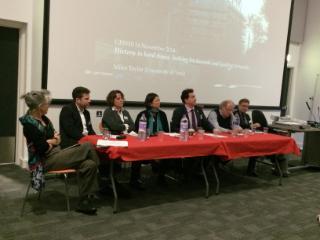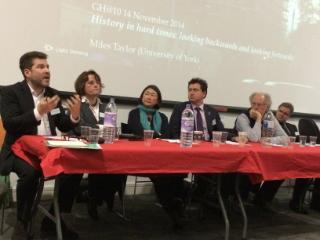The 10th anniversary of the Goldsmiths History Department was celebrated on 14 November 2014
Article

Jane Powell, Deputy Warden, and Vivienne Richmond, Head of Department, welcomed an engaged audience who enjoyed a varied programme of lectures, films, and panel-based discussions on a range of historical topics, beginning with new perspectives on World War I. Richard Grayson, Alex Watson, and Dejan Djokić presented papers focusing on Northern Ireland, Germany and Austria-Hungary, and Serbia respectively, concluding with questions chaired by Rosie Kennedy.
Professor Grayson explored the popular narrative of what happened to those members of the pre-war Ulster Volunteer Force who served in the British forces during the First World War, including their role on the Somme on 1 July 1916. Drawing on data for 139 identified members of the UVF who were resident in West Belfast, he argued that the focus on this date neglects a significant part of the UVF’s history.
Heading east, Dr Watson discussed themes from his acclaimed new book Ring of Steel: Germany and Austria-Hungary at War, 1914-1918, addressing WWI from the perspectives of its instigators and losers, the Central Powers. He questioned why their peoples went to war and the suffering they endured, and explained how the conflict’s escalating violence radicalised war aims, fragmented societies, and bequeathed to Central Europe a bitter and fateful legacy of weak states, political extremism, and race hatred.
Dr Djokić closed the panel, welcoming works that move away from traditional geographical and chronological boundaries and challenge the dominance of studies on Britain, France, and Germany during 1914-1918, and arguing that WWI cannot be understood fully without studying peripheries such as the Balkans, Poland, and Northern Ireland. He posited that WWWI might be seen as a central conflict in a 'long decade' of crisis, which began with the 1911-13 Italian and Balkan wars against the Ottomans and ended with the Greek-Turkish population exchange ten years later.
Panel two moved back in time to centre on memory and knowledge in the medieval and early-modern world, chaired by Diana Jeater. Anastasia Stouraiti presented her paper ‘Collecting the Past: Greek Antiquaries and Archaeological Knowledge in the Venetian Empire’ and Sarah Lambert spoke of using popular literature of the middle ages to gauge a response to crusading ideas and experiences amongst the ordinary recipients of academic propaganda. For example, The Play of St Nicolas (Jean Bodel, c.1200) suggests that literary myths and fantasies played a greater part in constructing a popular image of the ‘east’, the ‘Muslim’, and the ‘crusade’, than the direct or second-hand experience of crusaders, demonstrating that even the relatively humble and unlettered participated in the same imaginary culture as their more educated peers, and were similarly influenced by literary stereotypes in their understandings of the world outside Europe.
Jan Plamper, with talks from first-year Eoin O’Cearnaigh, who introduced his thesis ‘Wrecking at Ford: Workerist Politics and Shop-Floor Militancy in Britain Following 1968’, and third-year John Woolf. Mr Woolf presented his broader PhD research into the display of the anomalous body in 19th-century London by focusing on the social construction of a famous Victorian 'freak': the so-called Baboon Lady, Julia Pastrana.
After lunch thoughts turned to medicine and death, with viewings of an excerpt from Rebekah Lee’s film The Price of Death and a short visual paper on the court of Rashid al-Din by Ronit Yoeli-Tlalim.

Panel four addressed the social and cultural history of England and the British Empire. Papers were presented by Ariel Hessayon, Vivienne Richmond, and Erica Wald, with questions chaired by John Price.
Dr Hessayon compared approaches to the studies of early modern English radicalism and Western Esotericism, suggesting both common elements and differences in how scholars have treated them. He posited that while the majority view has seen a strong connection these two fields, that link has been made too strongly and, while there are notable examples demonstrating this connection, thoughts should turn not just to radicalism and Esotericism, but to reform and alchemy, astrology, magic, etc.
Dr Richmond spoke on themes covered by her book Clothing the Poor in Nineteenth-Century England, followed by Dr Wald’s examination of the range of permitted – and encouraged – social activities for European soldiers serving in India during the nineteenth century. She argued that these activities reflected contemporary army ideas about the 'ideal' soldier and about the class composition of the men.
Miles Taylor’s keynote lecture ‘History in Hard Times: Looking Back… And Forward’ reflected on the study of History and its place in Higher Education and discussed the future of the discipline. Questions around the status of the subject and the value of the humanities in general were extended into the plenary panel’s lively roundtable conversation, chaired by Dejan Djokić.
The panel, comprised of Jan Plamper, Vesna Goldsworthy (Kingston University), Sally Alexander (Goldsmiths Emerita Professor), Peter Mandler (Cambridge University), and Naoko Shimazu (Birkbeck, University of London), introduced their fields of interest, engaging in a lively discussion.
Professor Mandler, who is also the president of the Royal Historical Society, provided the audience with an insight into his ongoing research on the history of education in Britain (subject of a series of RHistS 'presidential lectures' delivered between 2013 and 2016 and a forthcoming book), discussing some of the History-related issues raised by Professor Taylor in his keyonote. Vesna Goldsworthy, who is a professor of English literature and creative writing, followed up with brief reflections on how her work engages with the discipline of history and with Balkan area studies, raising the issues of inter- and cross-disciplinarity, so central to much of the research carried out at Goldsmiths. Professor Shimazu then discussed her pioneering project on 'diplomacy as theatre', using the 1955 Bandung conference as a case-study. Naoko's work is part of a growing field of 'cultural history of diplomacy', which may be said to have revived and revitalised the once unfashionable field of 'diplomatic history'.
In her short presentation Professor Alexander discussed the history of the Goldsmiths History department, recalling key scholars and scholarship and tracing the department's emergence into a separate unit a decade ago. Professor Plamper finished with a sketch on the history of emotions, highlighting the current boom in the field, which started with 9/11, and generated a new hunger for a ‘real’, prediscursive reality, accelerating the turn away from poststructuralism. Consideration was given to how this young field might develop, specifically ways of talking about emotional characteristics of large social aggregates (e.g. nations) that avoid lapsing into ‘national character’, and of specific periods without lapsing into ‘age of glory’.
The day finished with informal discussions over a wine reception and then dinner at Meze Mangal.